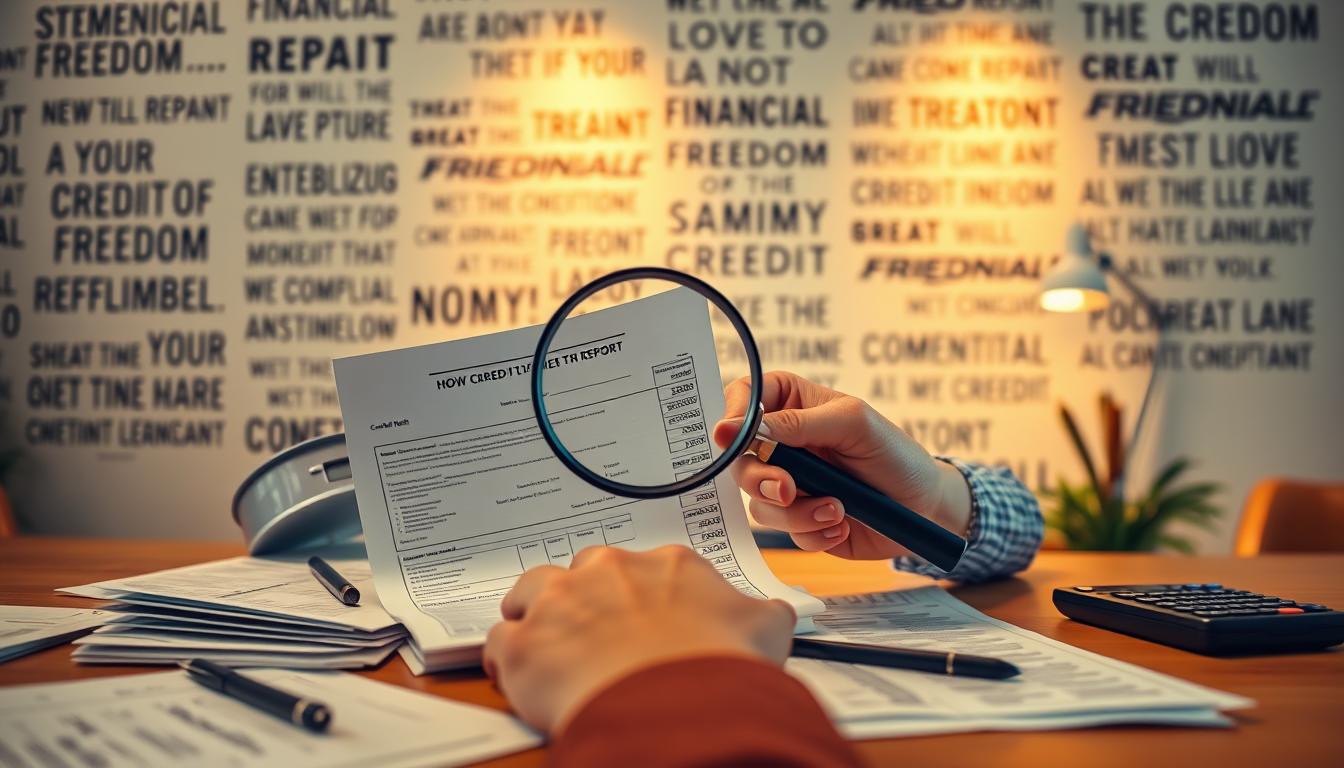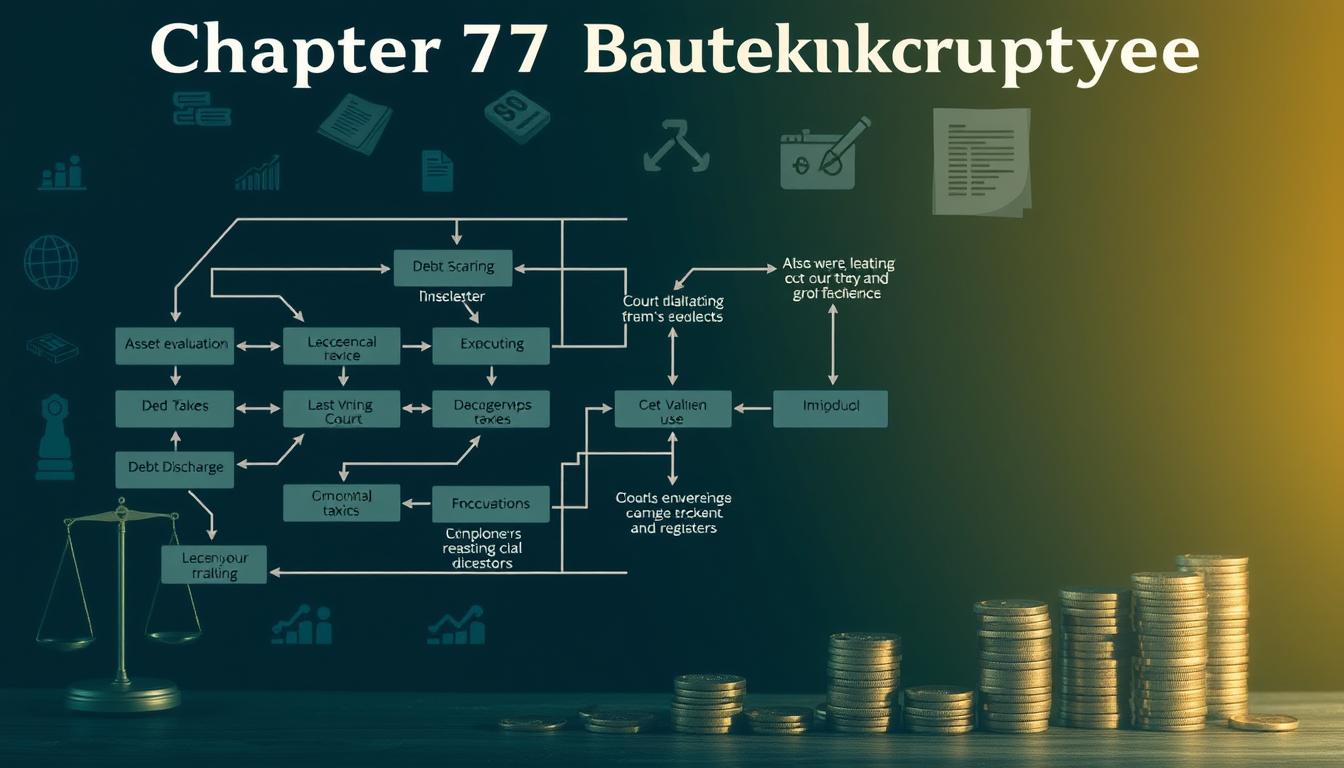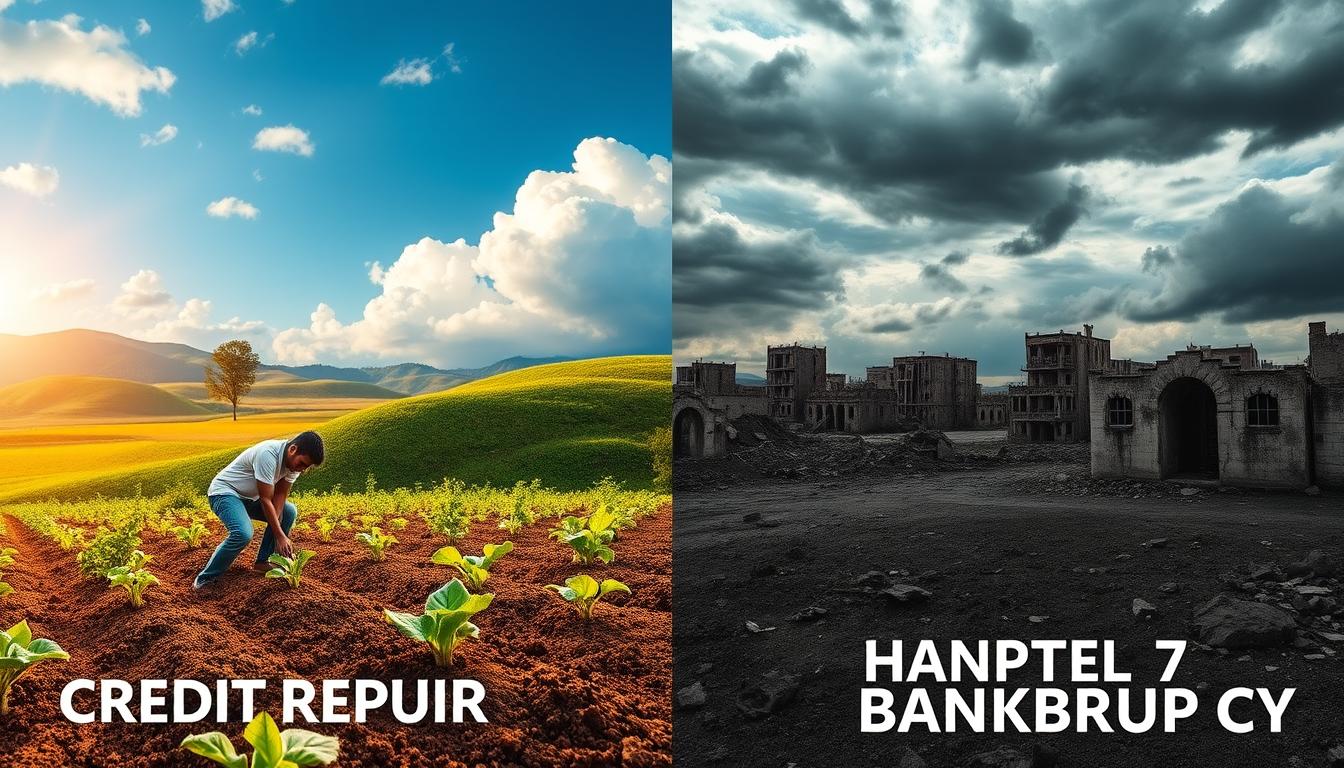Debt can be overwhelming. Two main options exist for those facing financial challenges: credit repair and Chapter 7 bankruptcy. Let’s explore these debt relief solutions and their differences.
We’ll look at the pros and cons of each option. This will help you choose the best path for your unique financial situation.
Key Takeaways
- Credit repair and Chapter 7 bankruptcy are two distinct debt relief options with different implications.
- Understanding the processes and eligibility requirements for each option is crucial in making an informed decision.
- Factors such as credit score impact, recovery timelines, and financial costs should be carefully considered.
- Alternatives like debt consolidation and credit counseling may also be worth exploring.
- The choice between credit repair and Chapter 7 bankruptcy depends on your specific financial circumstances and long-term goals.
Understanding the Differences Between Credit Repair and Chapter 7 Bankruptcy
Debt relief comes in two main forms: credit repair and Chapter 7 bankruptcy. These approaches differ greatly in their methods and long-term effects.
Overview of Credit Repair and Chapter 7 Bankruptcy Processes
Credit repair involves working with experts to fix credit report errors. It also includes negotiating with creditors and creating a debt repayment plan. This method helps improve credit scores over time.
Chapter 7 bankruptcy is a court-supervised process for debt relief. It allows people to liquidate non-exempt assets and discharge eligible debts. This option provides quick relief but can harm future borrowing abilities.
Key Factors to Consider When Choosing Between the Two Options
- The amount of debt you have accumulated
- Your income and ability to make consistent payments
- The potential impact on your credit score and credit report
- Your long-term financial goals and plans for rebuilding your credit
Credit repair suits those with manageable debt seeking to avoid bankruptcy’s consequences. For those with overwhelming debt, Chapter 7 bankruptcy might be more appropriate.

Your choice depends on your unique financial situation and goals. Consult a financial expert to find the best path forward.
What is Credit Repair?
Credit repair helps fix errors on your credit report. It involves working with a service or non-profit agency. They dispute mistakes, negotiate with creditors, and create debt payment plans.
The main aim is to boost your credit score. It improves your creditworthiness without filing for bankruptcy.
How Credit Repair Services Work
Credit repair companies charge monthly fees for their services. They review your credit report and spot errors. Then, they dispute these issues with credit bureaus.
These companies also talk to creditors. They try to remove or change negative entries. This can include late payments, collections, or charge-offs.
Pros and Cons of Credit Repair
- Benefits of Credit Repair: Avoiding the long-term consequences of bankruptcy, the ability to gradually rebuild your credit, and the potential to negotiate better terms with creditors.
- Drawbacks of Credit Repair: Ongoing monthly fees, the potential for limited success if creditors refuse to cooperate, and the temporary negative impact on your credit score while accounts are being disputed. Some credit repair companies have also been known to engage in unethical practices, so it’s important to vet any providers carefully.
Credit repair can help improve your credit without bankruptcy. It offers a way to rebuild your financial standing. However, consider the costs and limits before deciding.

| Credit Repair Benefits | Credit Repair Drawbacks |
|---|---|
| Avoid long-term bankruptcy consequences | Ongoing monthly fees |
| Gradually rebuild credit | Limited success if creditors refuse to cooperate |
| Negotiate better terms with creditors | Temporary negative impact on credit score |
What is Chapter 7 Bankruptcy?
Chapter 7 bankruptcy is a legal process that erases eligible debts. It starts with credit counseling to review your finances. Then, you file a bankruptcy petition with the federal bankruptcy court.
Overview of the Chapter 7 Bankruptcy Process
After filing, a trustee is assigned to manage your case. They may sell non-exempt assets to pay creditors. If approved, you’re freed from remaining eligible debts.
Eligibility Requirements and Qualifications
To qualify for Chapter 7 bankruptcy, you must pass a means test. This shows your income is below your state’s median. Bankruptcy exemptions let you keep some property, like your home and car.
If you don’t qualify for Chapter 7, Chapter 13 might be an option. It involves a court-supervised repayment plan instead of asset liquidation.

“Chapter 7 bankruptcy is a powerful legal tool that can provide a fresh start for individuals struggling with overwhelming debt.”
credit repair vs chapter 7
Financial challenges often lead to a choice between credit repair and Chapter 7 bankruptcy. Both options affect credit scores and reports differently. They also have distinct recovery timelines for rebuilding credit.
Impacts on Credit Scores and Credit Reports
Credit repair and Chapter 7 bankruptcy impact creditworthiness differently. Credit repair may cause a temporary score dip during account disputes. However, successful repair can gradually improve credit standing.
Chapter 7 bankruptcy has a more severe, long-lasting effect. It stays on credit reports for up to 10 years. This can significantly damage one’s creditworthiness.
Timeframes for Recovery and Rebuilding Credit
Recovery timelines vary between credit repair and Chapter 7 bankruptcy. Credit repair’s dispute process can take several months. Improvements may show within 2-3 years with responsible credit use.
Chapter 7 bankruptcy’s impact can last up to 10 years. However, its worst effects on credit scores tend to lessen over time. Rebuilding strategies work for both options.
These strategies include using secured credit cards and becoming an authorized user. Making on-time payments also helps rebuild credit after either choice.
| Metric | Credit Repair | Chapter 7 Bankruptcy |
|---|---|---|
| Impact on Credit Score | Temporary dip, followed by gradual improvement | Severe and long-lasting, up to 10 years |
| Timeline for Recovery | 2-3 years with responsible credit usage | Up to 10 years, with diminishing effects over time |
| Credit Building Strategies | Dispute negative items, use secured credit cards, become authorized user | Use secured credit cards, make on-time payments, become authorized user |
Choosing between credit repair and Chapter 7 bankruptcy depends on your financial situation. Consider your credit history and long-term goals. Understanding each option helps make an informed decision that fits your needs.

Weighing the Costs and Benefits
Choosing between credit repair and Chapter 7 bankruptcy requires careful consideration. Both options have costs and long-term effects on your financial health. Let’s explore the financial implications of each choice.
Financial Costs
Credit repair services usually charge monthly fees that can accumulate over time. Chapter 7 bankruptcy involves a one-time filing fee and possible attorney costs.
The immediate expenses for credit repair may be lower. However, bankruptcy’s long-term impact on credit scores and future borrowing can be more significant.
Long-Term Implications
Credit repair and bankruptcy affect financial goals and borrowing ability differently. Credit repair may temporarily lower your score, but the damage is usually less severe.
Bankruptcy can stay on your credit report for up to 10 years. This can make getting loans, credit cards, housing, or jobs more challenging.
Consider credit repair fees, bankruptcy filing costs, and long-term financial implications. This helps you make an informed decision that fits your situation and financial planning goals.
| Factors | Credit Repair | Chapter 7 Bankruptcy |
|---|---|---|
| Financial Costs | Monthly fees charged by service providers | One-time filing fee, potential attorney costs |
| Long-Term Impact | Temporary credit score reduction, shorter recovery period | Significant credit score impact, longer recovery period (up to 10 years) |
| Future Borrowing Ability | May be more challenging, but less severe than bankruptcy | Significantly more difficult to obtain loans, credit cards, or secure housing/employment |
“Carefully weighing the costs and benefits is crucial when deciding between credit repair and Chapter 7 bankruptcy. The long-term financial implications can have a lasting impact on an individual’s goals and financial well-being.”
Alternatives to Consider
Credit repair and Chapter 7 bankruptcy aren’t your only options. Debt consolidation loans and debt management plans offer middle-ground solutions. These strategies can help manage debt without bankruptcy’s long-term effects.
Debt Consolidation and Debt Management Plans
Debt consolidation merges multiple debts into one loan, often with lower interest. This simplifies repayment and may reduce overall debt costs.
Debt management plans are offered by non-profit credit counseling agencies. They negotiate with creditors to lower interest rates and monthly payments.
Credit Counseling and Debt Negotiation
Non-profit credit counseling agencies provide valuable debt relief services. They offer guidance on budgeting and debt management.
Unlike credit repair companies, these agencies don’t dispute negative credit report items. Instead, they create debt management plans for gradual debt repayment at reduced rates.
This approach suits those who can’t qualify for or want to avoid bankruptcy. It allows for debt repayment without severe credit impacts.
Explore these debt relief strategies to find the best fit for your finances. Consider your long-term goals when choosing an alternative to bankruptcy.
When is Credit Repair the Better Option?
Credit repair suits those with manageable debt and steady income. It’s ideal when inaccurate items harm your credit report. This method improves credit scores without bankruptcy’s long-term effects.
Some prefer credit repair to avoid bankruptcy’s public record. It allows active resolution of negative credit report items. This approach leads to better credit scores and future credit-building opportunities.
Scenarios Where Credit Repair May Be the Preferred Choice
- You have manageable levels of debt and a steady income.
- Your credit report contains inaccurate or unfair items that are negatively impacting your credit score.
- You want to avoid the public record and stigma associated with bankruptcy.
- You are willing to commit to a multi-year debt repayment plan.
Tips for Successful Credit Repair and Rebuilding Credit
- Work with a reputable credit repair company or non-profit credit counseling agency to address and resolve negative items on your credit report.
- Closely monitor your credit reports for any changes or new errors, and dispute any inaccuracies promptly.
- Develop healthy financial habits, such as making on-time payments and keeping credit card balances low.
- Utilize credit monitoring tools to track your progress and receive alerts about changes to your credit profile.
- Consider securing a secured credit card to help rebuild your credit history over time.
Credit repair offers advantages for improving your financial situation. By following best practices, you can boost your credit score. This approach helps regain control of your finances without bankruptcy’s lasting impact.
When is Chapter 7 Bankruptcy the Better Option?
Chapter 7 bankruptcy can offer a fresh start for those with overwhelming financial troubles. It discharges eligible debts when other options fall short. This allows individuals to rebuild their credit and regain financial stability.
Situations Where Chapter 7 Bankruptcy May Be Best
Chapter 7 bankruptcy may be the preferred solution in the following scenarios:
- Loss of employment or significant reduction in income
- Extensive medical bills or expenses due to a health crisis
- Inability to make minimum payments on existing debts
- Exhaustion of other debt relief alternatives, such as debt consolidation or credit counseling
Steps to Take Before and After Filing for Bankruptcy
Before filing for Chapter 7 bankruptcy, seek credit counseling to explore all debt relief options. If bankruptcy is necessary, gather financial documents and consult a bankruptcy attorney. They’ll guide you through the bankruptcy filing process.
After approval, focus on post-bankruptcy strategies to rebuild your credit. Get a secured credit card, make timely payments, and check your credit report regularly. With discipline, you can recover from chapter 7 bankruptcy and achieve financial stability.
Conclusion
Credit repair and Chapter 7 bankruptcy are potential solutions for overwhelming debt. Your choice depends on your financial situation, debt amount, and long-term goals. Consider each option’s pros and cons carefully.
Credit repair suits those with manageable debt and steady income. It helps address negative credit report items and rebuild credit scores gradually. Chapter 7 bankruptcy may be necessary for those facing insurmountable debts.
Weigh the short-term and long-term effects of each option. Explore all available debt relief alternatives. Seek guidance from financial professionals to make an informed decision.
Credit counselors or bankruptcy attorneys can provide valuable insights. Their expertise will help you choose the best path for your financial well-being.
FAQ
What is the difference between credit repair and Chapter 7 bankruptcy?
What factors should I consider when choosing between credit repair and Chapter 7 bankruptcy?
How does credit repair work?
What is the Chapter 7 bankruptcy process like?
How do credit repair and Chapter 7 bankruptcy impact my credit score and credit report?
What are the financial costs associated with credit repair and Chapter 7 bankruptcy?
What are some alternatives to credit repair and Chapter 7 bankruptcy?
When is credit repair the better option?
When is Chapter 7 bankruptcy the better option?
Source Links
- Debt Relief vs. Bankruptcy: Understanding Your Options – https://www.investopedia.com/debt-relief-vs-bankruptcy-understanding-your-options-8419029
- Credit Counseling vs. Bankruptcy: Which Should You Choose? – https://www.debt.org/bankruptcy/vs-credit-counseling/
- Bankruptcy vs. Debt Relief: Which Option Is Best for You? – https://www.incharge.org/bankruptcy/debt-settlement-vs-bankruptcy-which-is-right-for-you/

